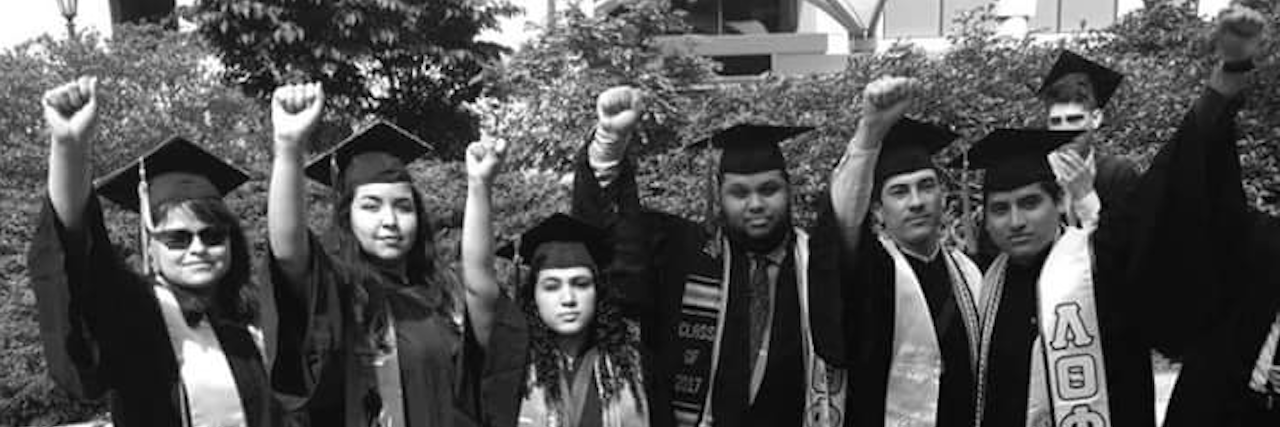“Mija, tu estudia para que no sufras como yo.”
Mi tia told me this after receiving only five dollars in food stamps, despite quite literally breaking her back for over four decades within a country that promised her a dream.
“Mija, tu estudia para que no sufras como yo.”
Mi papi would tell me this as a reminder of the exhausting labor of working for over two decades as a taxi driver to only earn between 13 to 15,000 dollars a year to support two daughters as a single father, following my mother’s passing. I’m constantly reminded of W.E.B. Du Bois’ question “What does it feel like to be a problem?” and think, It feels like an old aching pain that never goes away.
Years later, finally as a Cornell University graduate, I still feel this struggle. The morning of my graduation, I had a two-hour long panic attack at 5 a.m. on the floor of my bathroom, afraid I will have to continue this legacy of luchando in order to lift myself out of the worsening systemic bullsh*t my community is drowning in.
Gentrification is evicting my family in the South Bronx. After I graduated, I spent three whole days in bed, two of them spent sleeping for 20 hours straight because of the deep depression and fear I felt. I believed I was an imposter for graduating, and I felt utterly guilty for the pain I inflicted on my friends and family for even feeling pain to begin with. I felt I was a burden because I wasn’t happy I graduated. My graduation served as a reminder of the weight that first-generation children to first-generation American families carry: This country wasn’t the dream — we were.
Why do our families struggle? Who is hurting them? The article “My Education is the Explosion of my Mother’s Dream Deferred” on SupaDaily Latina describes the generational anguish of womxn of color, in particular Latinx immigrant mothers, resisting structural, systemic and institutional oppression. I couldn’t help but to see my own experiences bleed into each word written by Rocio Z., in particular:
“At the age of 12, my mother said goodbye to her school friends in tears and began working because her parents couldn’t afford to feed her and her siblings. She’s told me this story countless amount of times and I still see the melancholy in her eyes every time she remembers it. Through these stories and through witnessing her arduous physical labor, I began to understand that we live in a society that doesn’t value the labor of people of color who don’t posses a formal education. It was at this point in which I perceived formal education to not only be an escape out of poverty but a necessary tool for survival. I felt a mix of rage and helpless unrest so I engaged in a disruptive act against this system of inequality and oppression: I pursued my education.”
Mami, I still struggle with institutional pain.
Above all, many still romanticize and appropriate my narrative in order to insist I should be so grateful and lucky that I am “the first” and the “savior” of my family for graduating as a first-generation, low-income, disabled Latinx womxn from the South Bronx.
“She made it out of the hood!”
Y’all sh*tting me, right? We are conditioned to desire running away from our communities by these romanticized narratives, so that we may never run into the bedrock — the foundation — that is truly complicit in perpetuating these problematic structures.
For folks who fetishize my lucha: I can gladly offer you my depression, anxiety, PTSD, medications, panic attacks, perpetual state of mourning and chronic self-doubt if y’all really want to write a think-piece regarding the profound beauty of “The Struggle.” It might make pulling yourselves up by your blood-stained Louis Vuittons heel straps on the back of marginalized folks labor significantly more compelling.
To graduate from Cornell University meant I wouldn’t erase my history in order to liberate myself from remembering the pain tethered to it. Rather it means I would create a radical and unapologetically hyper-visible medium for my narrative to survive — a story that has existed only in between the lines and spaces of history books written by white, cis/hetero, colonialist/genocidal, wealthy, able-bodied men. Mi cuento is uncomfortable because it implicates and holds accountable those who’ve perpetuated my — and that of my community’s — pain. The story written by me, my mother, my family and my community is mine to carry. To be a writer, to be a luchadora and to be a scholar didn’t mean I would cease from struggling; rather, I would hold the duty to reveal and dismantle the systemic struggle of my people because of the privileges I now hold as a college graduate.
Esa es la lucha que yo calgo en mi espalda. This is the weight of the world on this bridge called my back. I don’t have time to be a coward. That’s a luxury.
Y’all have tried me for 600 years. Y’all have tried me for the 22 years of my own life. Y’all have tried me for the four years I struggled and thrived at Cornell University.
The thing many truly wish upon Latinx folks and other people of color is our erasure as they linguistically position us as subhuman, alien and pests to be exterminated.
“Get the fuck out,” is what was demanded of me by a white man this past week. He ordered me to do the very same thing this institution has been whispering to me for the past four years, and what this country and planet has been lashing at my ancestors for the entirety of our existence: to get the fuck out. I don’t think so.
I’m here to stay, slay and reclaim. The suffering ends with me.
This post originally appeared on The Huffington Post.
We want to hear your story. Become a Mighty contributor here.
Photo via contributor.

